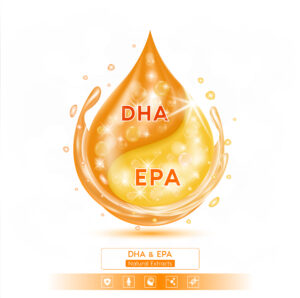Fats are Essential
(reviewed/updated 4-2-2024)
We do need some fats!
Among other things, fats are used to pad our organs, regulate body temperature, and help absorb fat-soluble vitamins such as A, E, D, and K. However, it's very easy to over-consume fat, in which case our body will store it.
There are two essential fatty acids which our bodies cannot produce and must be consumed (hence the name essential). Those are Linolenic acids and Linoleic acids, a.k.a. Omega-3 and Omega-6. However, we need these fats in appropriate amounts to sustain a healthy balance (the omega-6:3 ratio).
Our bodies need BOTH types of fatty acids for good function, but omega-3 has numerous health benefits (heart health, brain function, anti-inflammatory, and more). There are at least eleven types of omega-3, but the three most important are ALA, EPA, and DHA.
ALA (Alpha-linolenic acid)
...is the most common omega-3 fatty acid in the diet. It's mostly found in plant foods and is the necessary precursor for our bodies to produce (convert) into EPA (eicosapentaenoic acid) and DHA (docosahexaenoic acid) through the actions of a series of enzymes.
ALA/Omega-3 is found in kale, spinach, soybeans, walnuts, and many seeds such as flax, chia, and hemp. Omega-3 is also found in romaine, berries, beans, vegetables and fruits.
Omega-6, on the other hand, while we do need certain amounts for good health, can produce harmful prostaglandins that contribute to inflammation when we consume too much. That happens when the omega 6 linoleic acid converts into another fatty acid called arachidonic acid (AA). Sources of Omega-6 include avocado, extracted oils, land animals, and certain nuts and seeds.
The Standard American Diet, filled with oils and animal products, contributes greatly to the overload of Omega-6 intake in our country.
The majority of Americans are eating way more oils than they suspect. Processed vegetable oils are prevalent in restaurant foods, and are often hidden in packaged foods such as salad dressing, frozen entrees, crackers, breads, cereals, baked goods, and anything fried. (Read more about the concern over oils here.)
Recommendations
- Instead of focusing solely on increasing Omega-3, it's also crucial to greatly reduce the consumption of Omega-6 fatty acids. Note: animal foods and oils SHOULD be eliminated for optimal health; but other sources of Omega-6 include avocado, cashews and other nuts, sesame seeds, peanuts, and refined /processed junk food (vegan or not). High-fat plant foods should be used sparingly for a variety of reasons, especially since our fat intake should be kept at 10-15% of total calories.
- Add a tablespoon of ground flax seed to your diet each day. Flax seeds are a concentrated source of ALA, which our bodies convert to Omega-3. You'd have to eat 3.2 pounds of salmon to get the equivalent amount of ALA found in 1/4 cup of flax seed. (Note: This does NOT apply to flaxseed oil). Flax is also a great source of fiber and also contains cancer-fighting lignans. Grind it fresh each day for optimal nutrition.
- Increase your intake of greens, beans, berries, broccoli, soybeans, vegetables, and certain fruits.
- If you're truly concerned about your fatty acid levels, order your own blood test from UltaLabTests.com. For about $49 (at the time of this writing), you can have a simple blood test performed to check your Omega-3 and Omega-6 levels, your EPA, DHA, ALA, your Omega-3:6 ratio, and more.
- Unless you're found to be deficient in a nutrient, including fatty acids, there's really no need to take supplements unless your doctor provides a legitimate reason. This is solely your decision, of course, and I'm sharing this with you as "general information," not specific medical advice. Throughout my many years of training, I was taught by several credible doctors that taking unnecessary supplements (with the exception of B12) can cause imbalances in other parts of the body; and the research backs that up. When we get our vitamins and minerals through food, our bodies can pick and choose exactly what it needs to function each day; that's known as 'selective absorption.' But when we ingest supplements, however, the body is forced to deal with whatever we've introduced. As the saying goes, if it ain't broke, don't fix it.
- If you do decide to take supplements or prescription Omega-3 drugs, I encourage you watch this video by Dr. Pam Popper. She's written extensively on this topic over many years and provides information you should know before you supplement or take a prescription for fatty acids.
- Lastly, make sure to do your due diligence when it comes to supplements by investigating the research yourself. Use my tips - 7 Ways to Evaluate What You Hear and Read - for more guidance. You'll find that article here.
For more information about inflammatory foods, please consider my class.
For a free webinar on "3 Food Mistakes" that most people are making, click here.

